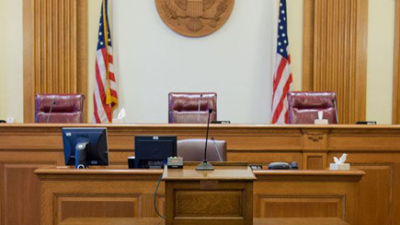Due Process and the Courts
What does the constitution say about due process?
The Fifth Amendment to the Constitution says clearly that no person shall be deprived of life, liberty, or property without the due process of law. Note that this says person, not citizen, and over the years the Supreme Court has consistently ruled that the Due Process Clause applies to all people in the United States.Do non-citizens have the right to due process in the U.S.?
Yes. The Constitution guarantees due process rights to all "persons," not just citizens. This means non-citizens, including undocumented immigrants, are entitled to fair treatment under the law. This includes the right to defend themselves in court. But recent Trump administration policies that speed up deportations and limit access to legal representation make it harder for non-citizens to get their fair day in court.- Access to legal representation Access to legal counsel is an essential part of our justice system and our democracy. In the criminal justice system, anyone facing even one day in jail gets a lawyer if they can't afford one. But immigrants facing deportation usually don't get that chance.The research is clear – the most effective way to ensure some level of due process for people navigating our complicated immigration system is for them to have trained attorney at their side. But Trump administration is now working to strip attorneys from as many people as possible, all in the name of increasing its deportation numbers. This attempt to eliminate basic due process will hurt people who already have few options.
- Fair day in court Due process guarantees that individuals have the opportunity to defend themselves in court. This includes non-citizens facing deportation.
Why is due process important?
We are seeing right now the importance of due process when it comes to President Trump's actions to carry out the so-called Alien Enemies Act, a 1798 wartime law that permits people to be deported outside of the normal framework of immigration law. President Trump has alleged that this law allows him to simply point at any person, declare them to be an alien enemy, and kick them out of the country without ever having a chance to see a judge. Thankfully, the Supreme Court said that is not true, and in a unanimous decision, ruled that people can challenge the Trump administration's invocation of the Alien Enemies Act. That is why due process is so important, because it means that no person can be rounded up and sent to another country without a chance to go to court and make the government prove their case.How is the American Immigration Council working to protect due process?
- We serve thousands of individuals in immigration detention centers through the Immigration Justice Campaign, our initiative with the American Immigration Lawyers Association. The Justice Campaign provides free legal services for immigrants who would otherwise have to navigate our complicated immigration system without a lawyer.
- We use the courts to demand a fair process for immigrants. Our litigation team is fighting back against the Trump administration’s blatant disregard for due process including filing a lawsuit challenging their illegal detention of immigrants in El Salvador’s notorious Terrorism Confinement Center (CECOT).

How to File a Petition for Review
Noncitizens may file a petition for review in the court of appeals to seek judicial review of a final removal order. This Practice Advisory addresses the procedures and general requirements for filing and litigating a petition for review. Read More

How to Get Judicial Relief Under 8 USC 1447(b) for a Stalled Naturalization Application
Section 336(b) of the INA, 8 U.S.C. § 1447(b), gives a district court jurisdiction to intervene in a case where USCIS has failed to make a decision on the naturalization application within 120 days of the applicant’s “examination” by USCIS. This Practice Advisory discusses the nuts and bolts of bringing a suit under INA § 336(b). It also discusses when attorneys fees under the Equal Access to Justice Act are available. Read More

Supreme Court to Consider Whether DHS Can Subject Noncitizens to Prolonged, Mandatory Detention
Last month, the Supreme Court announced that, in fall 2016, it will hear arguments in Jennings v. Rodriguez, a challenge to the prolonged detention of noncitizens in removal proceedings. At issue is whether the government can keep a noncitizen who is fighting her deportation case locked up for however… Read More

DHS and Immigration Courts Sued Over One-Year Asylum Deadline
Immigration law imposes a one-year deadline, beginning upon arrival in the United States, within which an asylum seeker must apply for asylum. With very limited exceptions, an individual who misses this deadline becomes ineligible for asylum. Even though the clock is ticking for these asylum seekers, DHS agents and officers… Read More

Video Hearings in Immigration Court FOIA
Beginning in the mid-1990s, the Executive Office for Immigration Review (EOIR) began using video hearing equipment in immigration courts across the country. As a result, frequently a noncitizen facing removal is deprived of the opportunity to appear in person before an immigration judge. Video hearings are more common where a noncitizen is detained, though many non-detained individuals are subjected to video hearings as well. EOIR uses video hearings for both preliminary hearings (“master calendar hearings”) and merits hearings (“individual hearings”). In February 2012, the American Immigration Council submitted a Freedom of Information Act (FOIA) request to EOIR asking for records related to video teleconferencing (VTC). EOIR produced two sets of records. Read More

Thousands of Children Now Covered in Access to Counsel Lawsuit
Last week, a federal court certified a class in a lawsuit challenging the federal government’s failure to provide legal representation to children in deportation proceedings. Several thousand children are estimated to be members of the class. This lawsuit, F.L.B. v. Lynch, was filed in U.S. District Court in Seattle. Read More

Supreme Court Issues Disappointing Split Decision in United States v. Texas
The Supreme Court issued a 4-4 decision in United States v. Texas, the case challenging expanded Deferred Action for Childhood Arrivals (DACA) and Deferred Action for Parents of Americans and Lawful Permanent Residents (DAPA). This means that the Fifth Circuit’s decision upholding the preliminary injunction against these initiatives will stand. The… Read More

Empty Benches: Underfunding of Immigration Courts Undermines Justice
Backlogs and delays benefit neither immigrants nor the government—keeping those with valid claims in limbo and often in detention, delaying removal of those without valid claims, and calling into question the integrity of the immigration justice system. Read More

These Anti-Immigrant Organizations Are Behind the Effort to Derail Executive Action on Immigration
The tentacles of the modern anti-immigrant movement in the United States extend far and wide, but they emanate from a single source: John Tanton—a white nationalist trying his hardest to ensure that racial and ethnic minorities, fed by immigration and relatively high birth rates, don’t one day outnumber non-Latino… Read More

Judge Hanen Halts Order That Would Have Revealed Personal Information of DACA Recipients
Judge Hanen halts his order that would have the Department of Justice (DOJ) turn over personal information of about 50,000 individuals who have received three-year reprieves from deportation and three-year work permits under the Deferred Action for Childhood Arrivals (DACA) initiative. This original May 19, 2016 order will… Read More
Make a contribution
Make a direct impact on the lives of immigrants.
